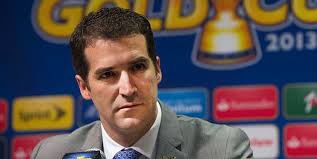By Paul Nicholson
June 2 – Back stage the confederation was in turmoil with employees only just having been allowed back into their Miami offices, news of bans of their top officials, and rumours that in the Cayman Islands employees had been relieved of their phones and laptops; front stage CONCACAF conducted the draw for the group stages of the 2015/16 Champions League. If it wasn’t quite business as usual, it was a welcome relief from the dark politics of corruption that have returned to consume the regional body.
Enrique Sanz, the general secretary of the confederation who has been battling cancer for the past year, was provisionally banned by the chairman of FIFA’s adjudicatory chamber of the Ethics Committee, Hans-Joachim Eckert. following “the latest facts presented by the US Attorney’s Office for the Eastern District of New York”.
Sanz had already been put on leave of absence on May 28 by CONCACAF for medical reasons – and it is believed this was a real medical reason after suffering an adverse reaction to his treatment drugs. He did not attend the FIFA Congress in Zurich last week.
Yesterday he was provisionally banned from carrying out any football-related activities at national and international level. A couple of hours later CONCACAF’s own executive committee also announced a ban on Sanz, pending the outcome of the FIFA Ethics Committee investigation
Sanz had presided over the CONCACAF Congress last month in the Bahamas in what was a triumphant return to his duties after illness. Warmly welcomed back by CONCACAF president Jeffrey Webb, even president Sepp Blatter remarked to Congress how good it was to see him back to health and work.
Sanz was offered the job of general secretary by Webb in 2012. He was previously running Traffic Sports. In the US indictment of last week Sanz is identified as co-conspirator #4, and accused of introducing the ‘culture’ of soliciting bribes to secure marketing rights to CONCACAF properties.
There can be little doubt that Sanz was a talented football administrator having been a leading force in driving through a number of initiatives including new regional competitions and educational initiatives. He was behind the commercial re-packaging of the Gold Cup alongside Traffic Sports US chief executive Aaron Davidson who was arrested at his Miami home last week and has subsequently pleaded not guilty to the charges against him.
With Webb, Sanz had led a confederation that had virtually no visual presence and not much activity under the previous leadership duo of Jack Warner and Chuck Blazer, to becoming a dynamic organisation that was attracting global attention. Insideworldfootball has followed the progress and documented the initiatives in depth. But hidden beneath the shiny exterior of good work lurked the illegal payments to individuals linked to the award of the marketing rights.
There is no indication in the US Department of Justice documentation that Sanz received money himself from the award of the rights while he was general secretary of CONCACAF, but as co-conspirator #4 his name peppers the document.
CONCACAF is currently being managed by a Special Committee compromising FIFA executive committee member and US Soccer Federation president Sunil Gulati, Mexican president Justino Compean and Canadian FA president Victor Montagliani. Stand-in president Alfredo Hawit, the Honduras FA president and a lawyer, has taken the role for a second time having filled in before Webb’s election and after Warner was kicked out.
CONCACAF’s Miami offices were searched last week with documents and computers taken. On Monday the organisation’s computer servers were returned and the offices were open.
But on Monday attention turned to CONCACAF’s Cayman Islands office where employees handed in phones and laptops as the confederation began its own investigations.
The draw for the Champions League at the New World Symphony Center on Miami Beach demonstrates a praiseworthy determination to continue building this competition. Though the attention will be more focused on the politics and extent of the corruption than the 24 teams that were sorted into eight groups for the Champions League qualifying rounds.
Congolese bans
Separately FIFA provisionally banned Congolese Football Association (FECOFOOT) Vice-President, Jean Guy Blaise Mayolas, and the General Secretary, Badji Mombo Wantete, from carrying out any football-related activities at national and international level. The bans are “based on the fact that various breaches of the FIFA Code of Ethics appear to have been committed”. The bans were handed down by Joachim Eckherdt, chairman of FIFA’s Adudicatory Chambers at the request of the chairman of the investigatory chamber, Dr Cornel Borbély.
Contact the writer of this story at moc.l1745056634labto1745056634ofdlr1745056634owedi1745056634sni@n1745056634osloh1745056634cin.l1745056634uap1745056634

